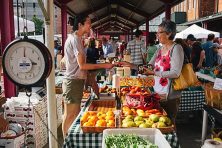How to Save at Farmers Markets

Grocery budgets are a sore spot for many American households. Food prices rose 23.6% from 2020 to 2024, according to the USDA Report on Food Price and Spending. This hit low-income families hard — about 30% of their income is devoted to groceries.
However, local farmers markets serve as a beacon of hope for those seeking fresh and affordable food.
Beyond providing access to high-quality produce, they allow people to support their communities. This article will explain the best ways to save at farmers markets.
How to Save at Farmers Markets
Farmers markets can certainly save you money on fresh produce. But they offer more than just economic advantages. You can build relationships, hone negotiation skills and get to know your community. Here’s how you can make the most of your farmers market trip.
Save Money Beyond Shopping at Farmers Markets
Knowing how to save at farmers markets can be a big relief for your food budget. But there are other easy ways you could be keeping more of your hard-earned cash. These are some of our favorite ways to save money.
| Offer | Why We Like It | What You Need to Do | Start Saving |
|---|---|---|---|
| The Penny Hoarder Auto Insurance Tool | Save ~$500 per year | Provide some basic information | |
| AmOne | Save on interest payments with a personal loan | Answer a 10 quick qualifying questions | |
| Balance Transfer Credit Cards* | Cancel Your Interest Payments Until 2026 | Apply for a 0% Interest Credit Card | |
| Upside | Save $40/month on Gas | Download this free app |
Pick Your Farmers Market
Farmers markets operate in harmony with the seasons in an interconnected microenvironment similar to a coral reef. Understanding this natural rhythm of supply and demand can be your ticket to savings. If you are conscious of the time and weather, you can shop in a less crowded, more favorable atmosphere.
Look for Seasonal Offerings
Each season ushers in a distinct bounty of produce at the pinnacle of ripeness and flavor. Seasonal offerings offer freshness and affordability, whether it’s the crisp autumn apples, spring strawberries or sweet summer corn.
Resist the urge to make impulse purchases. Take your time to stroll through the market, surveying the various selections to find vendors offering discounts or specials.
Take Advantage of Unfavorable Weather and Market Closing Times
While sunny days might seem ideal for shopping, bad weather can work in your favor. When the weather takes a turn for the worse — or as the day progresses — foot traffic at farmers markets tends to slow down.
Vendors who want to sell what they have left often offer discounts and deals, making the end of the market the best time for saving.
Build Relationships, Negotiate and Master the ‘Secret of Seconds’
Talking to vendors about their products, farming practices or their favorite recipes can garner many benefits. These relationships enhance the shopping experience and may score you some deals.
A well-kept secret of farmers markets is the availability of “seconds.” These fruits and vegetables fall short of the cosmetic standards of traditional grocery stores. However, they retain every ounce of their flavor and nutrition as their more aesthetically pleasing counterpart. By embracing “B-grade” produce, shoppers can enjoy significant savings.
Visit Different Markets For Multifaceted Travel Perks
As you become a pro at navigating local farmers markets, you might find yourself intrigued by the offerings of markets beyond your immediate area. Embarking on weekend trips to explore these distant gems can enrich your culinary experience and offer a delightful adventure.
An outing to farmers markets in neighboring towns or new regions is a great excuse to explore the pros and cons of other markets. Not only does this expand your knowledge base, but it can be an enjoyable day out.
If you frequently explore distant markets, consider using miles credit cards to earn travel rewards while you save on farm-fresh produce. This way, you’re doubly rewarded — once through local goods and again through miles you can use for future market explorations or vacations. Likewise, this lets you buy in bulk, develop a relationship with the seller and plan out your future purchases more effectively.
Other Ways to Maximize Your Farmers Market Experience
While the financial benefits may outweigh many others, the benefits to your local community and the environment are far more valuable than your grocery bill. Here are five tips to maximize these benefits:
- Research the Clean 15 and the Dirty Dozen to maximize the quality of your produce.
- Return reusable egg crates and berry trays to vendors to foster a mutually beneficial relationship.
- Bring cash and change, as most vendors prefer it.
- Buy in bulk and do collaborative shopping with friends and family.
- Extend the shelf life of purchases through preservation methods like freezing or canning.
Beyond Savings: Benefits of Farmers Markets
Farmers markets are more than places to buy fresh, seasonal produce and other goods. They’re good for the health of communities, too.
When you shop at farmers markets, you:
Back your community and reduce waste.
Purchasing directly from small-scale producers and artisans helps sustain local businesses, creates jobs and nurtures communities. This direct connection fosters a sense of accountability; unlike the anonymity of mass-produced grocery store goods, farmers market products come with a personal touch and a commitment to excellence.
You also play a vital role in reducing the environmental footprint associated with food production and distribution. Unlike supermarket goods that often travel long distances, items at farmers markets typically come from local farms.
Support community-building initiatives and promote healthy eating.
Farmers markets often extend beyond mere shopping experiences; they serve as hubs for community-building initiatives. These markets frequently host events, workshops and cultural celebrations, fostering a sense of togetherness and belonging. Many communities have industries that work alongside SNAP/EBT benefits.
There are different programs in different states and regions. You can see how many states give vouchers or coupons to match or provide a discount for SNAP/EBT beneficiaries shopping at farmers markets. Often, these savings can come in the form of a discount or a match in funds to spend on produce.
Farmers Markets: Save Money, Eat Well, Support Your Community
Farmers markets are a great way to ease the sting of food prices. They also prioritize fresh, whole foods over processed items. Shopping there makes you more likely to fill your basket with fruits, vegetables and wholesome health-forward products. Over time, this shift toward a healthier diet can lead to improved health and reduced health care costs for the rest of your life.
New York contributor Kiara Taylor specializes in financial literacy and financial technology subjects. She is a corporate financial analyst who also leads a group affiliated with University of Cincinnati that teaches financial literacy to Black students and helps them secure employment and internships.












